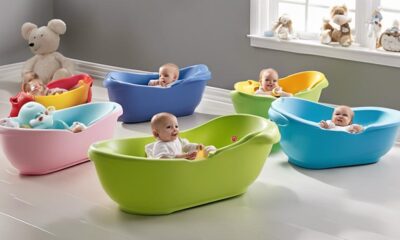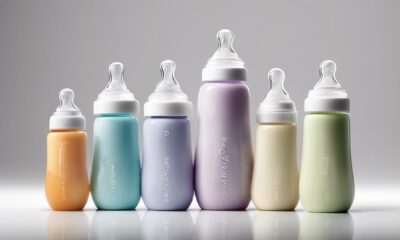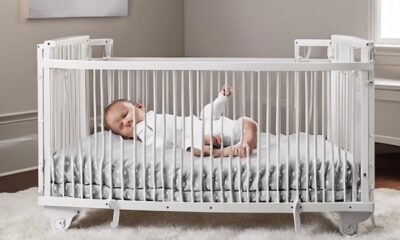Newborn Care
Quick Ways to Relieve Hiccups in Newborns
Hoping to stop newborn hiccups? Discover handy tips for instant relief that will leave you amazed at their effectiveness.

When hiccups strike your newborn, it's like trying to solve a puzzle with missing pieces. You may be wondering what quick fixes can help soothe your little one.
Well, imagine having a few simple tricks up your sleeve that could provide instant relief. Wouldn't that be a game-changer for those abrupt hiccup episodes?
Let's explore these efficient methods to ease hiccups in newborns and restore peace and comfort to your baby.
Key Takeaways
- Burp baby frequently to release trapped air and ease hiccups.
- Offer a pacifier to relax the diaphragm and stop hiccups effectively.
- Hold baby upright to reduce hiccups by releasing trapped air.
- Seek medical advice for persistent or severe hiccups in newborns.
Simple Soothing Techniques
When your baby starts hiccuping, it can be concerning, but there are simple ways to help them. One common cause of hiccups in babies is swallowing air while feeding, so try burping them more frequently during and after meals. This can release trapped air and ease their discomfort. Offering a pacifier to your little one may also help relax their diaphragm and stop the hiccups effectively.
Changing your baby's position can make a difference too. Holding them upright against your shoulder or sitting them up slightly could aid in alleviating those pesky hiccups. Remember, gentle movements can make a big impact. Sometimes a gentle rub on their back can help disperse any air bubbles that might be causing the hiccups, providing relief.
Gentle Patting and Rubbing

To assist your newborn with hiccups, gently patting and rubbing their back can effectively release trapped air and provide comfort. By utilizing this simple technique, you can prevent and alleviate those pesky baby hiccups.
Here are some key points to bear in mind:
- Release Trapped Air: Gentle patting and rubbing on your baby's back can help release trapped air that may be causing the hiccups.
- Relax Diaphragm: This method aids in relaxing the diaphragm, which can help in stopping hiccups in newborns.
- Soothe and Comfort: Patting and rubbing your baby's back not only helps release air but also soothes them, providing comfort during hiccups.
- Assist in Alleviating Spasms: By gently stimulating the baby's back, you can aid in alleviating the spasms that lead to hiccups.
Calming Holding Positions

If your newborn's hiccups persist despite gentle patting and rubbing, consider trying calming holding positions to help ease their discomfort and release trapped air more effectively.
Holding your baby upright can assist in allowing trapped air to escape, potentially reducing hiccups. Providing gentle chest support while holding your baby close to your chest in a relaxed position may help soothe their diaphragm and alleviate hiccups.
Placing your baby over your shoulder and patting their back gently can encourage burping, aiding in relieving hiccups. Supporting your baby's head and neck while holding them upright is beneficial for releasing air bubbles and stopping hiccups.
These holding positions not only offer comfort but also help prevent hiccups caused by the vocal cords. Remember, hiccups in newborns can sometimes be a sign of gastroesophageal reflux, so seeking medical advice if hiccups are frequent or severe is always advisable.
Pacifier and Bottle Adjustments
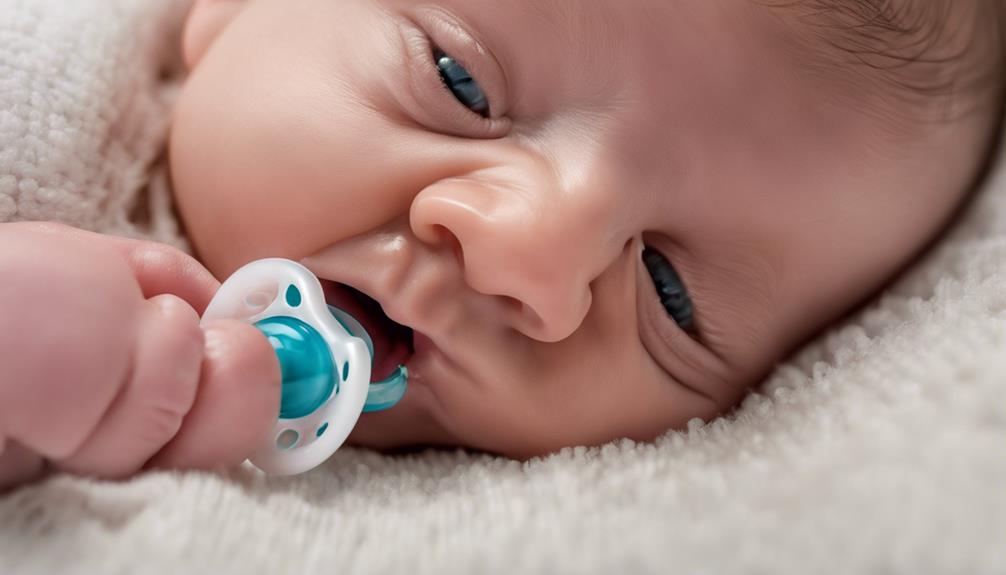
Consider offering a pacifier to help relax your newborn's diaphragm and potentially alleviate hiccups.
When it comes to bottle feeding, making a few adjustments can make a significant difference in preventing hiccups in your little one:
- Adjust the bottle's feeding position: Tilting the bottle slightly upwards can help reduce air ingestion, thereby minimizing the chances of hiccups.
- Opt for a slower-flow nipple: Using a nipple with a slower flow rate can help regulate the pace of feeding, decreasing the likelihood of hiccups.
- Guarantee a proper latch: A good latch and seal while bottle-feeding can help prevent excess air from being swallowed, reducing the occurrence of hiccups.
- Monitor feeding pace and bottle tilt: Pay attention to your baby's feeding pace and adjust the bottle tilt accordingly to help prevent hiccups during feeding sessions.
Medical Professional Consultation

When your newborn's hiccups persist despite making adjustments, seeking guidance from a pediatrician is essential for ensuring their well-being. While newborn hiccups are generally normal, persistent or concerning hiccups may require medical professional consultation. It's important to monitor your baby's overall well-being during hiccups and promptly report any unusual symptoms to the doctor. If the hiccups last for hours without relief or start affecting your baby's feeding and sleep patterns, it's advisable to seek medical advice. Discuss any concerns you have about how the hiccups are impacting your baby's quality of life with a healthcare provider. Below is a helpful table summarizing key points to consider when deciding to consult a pediatrician:
| Key Points | Action Needed |
|---|---|
| Hiccups lasting for hours | Seek medical advice |
| Interference with feeding/sleep | Consult a pediatrician |
| Impact on quality of life | Discuss with healthcare provider |
| Unusual symptoms | Monitor and report to doctor |
Frequently Asked Questions
Is It OK to Lay Baby Down With Hiccups?
Yes, it's perfectly fine to lay your baby down with hiccups. Hiccups are usually harmless and will stop on their own. Comfort your baby during this time instead of worrying about their position, as it doesn't affect them.
What Is the Best Position for Baby Hiccups?
For baby hiccups, the best position is holding them upright against your shoulder or in a slightly inclined position on your lap. Supporting their head and neck while gently patting their back can help release trapped air and ease hiccups.
What Stops Hiccups Quickly?
When hiccups hit, try burping, offering a pacifier, changing positions, or gentle back rubs. Remember, no adult tricks like breath-holding or scares. Keep it gentle and soothing for the little one. Ease those hiccups fast!
Do Hiccups Mean Baby Is Full?
Hiccups in babies do not necessarily mean they are full. Hiccups can happen for many reasons besides feeding. Look for other hunger or fullness cues to understand your baby's needs better. Trust your instincts.
Conclusion
To sum up, by using simple soothing techniques like gentle patting and calming holding positions, parents can quickly relieve hiccups in their newborns. Remember, it's important to create a calm feeding environment and seek medical advice if hiccups persist.
Soothe your baby with love and care, and soon those hiccups will be a thing of the past.
With a rich background in writing and a keen interest in child development, she specializes in creating insightful, compassionate content that speaks directly to parents’ concerns and aspirations. Margaret believes in the power of shared experiences to bring comfort and confidence to parents everywhere.
Newborn Care
7 Ways to Soothe Newborn Hiccups After Burping
Yearning to calm your newborn's hiccups post-burping? Discover 7 effective ways to ease their discomfort and find peace together.

Are you struggling to calm your newborn's hiccups after burping? There are simple yet effective methods to ease this discomfort for your little one.
From gentle back rubs to providing a pacifier, these techniques can offer relief and peace of mind for both you and your baby.
Let's explore these 7 soothing ways to help your newborn through those post-burping hiccups.
Key Takeaways
- Use physical soothing techniques like gentle back patting to relax diaphragm muscles.
- Offer a pacifier post-burping to distract diaphragm and regulate breathing.
- Try different positioning strategies to shift air bubbles and aid digestion.
- Consider alternative remedies like sugar water cautiously after consulting healthcare provider.
Gently Pat or Rub Your Baby's Back
Wondering how to soothe your newborn's hiccups? When your baby is experiencing those pesky hiccups, gently patting or rubbing their back can work wonders. This simple technique helps release any trapped air bubbles that might be causing the hiccups. By applying gentle pressure while patting their back, you can help relax the diaphragm, stopping the hiccups in their tracks. Remember to use a circular motion while patting or rubbing their back; this can effectively soothe the diaphragm muscles.
For extra relief, try patting or rubbing their back in an upward motion to assist with burping, which can also reduce hiccups. Consistency is key here – keep the back patting rhythmic to provide comfort to your little one and alleviate any discomfort caused by hiccups. So, the next time your newborn has hiccups, give them some gentle back pats in a soothing and rhythmic manner.
Offer a Pacifier to Suck On
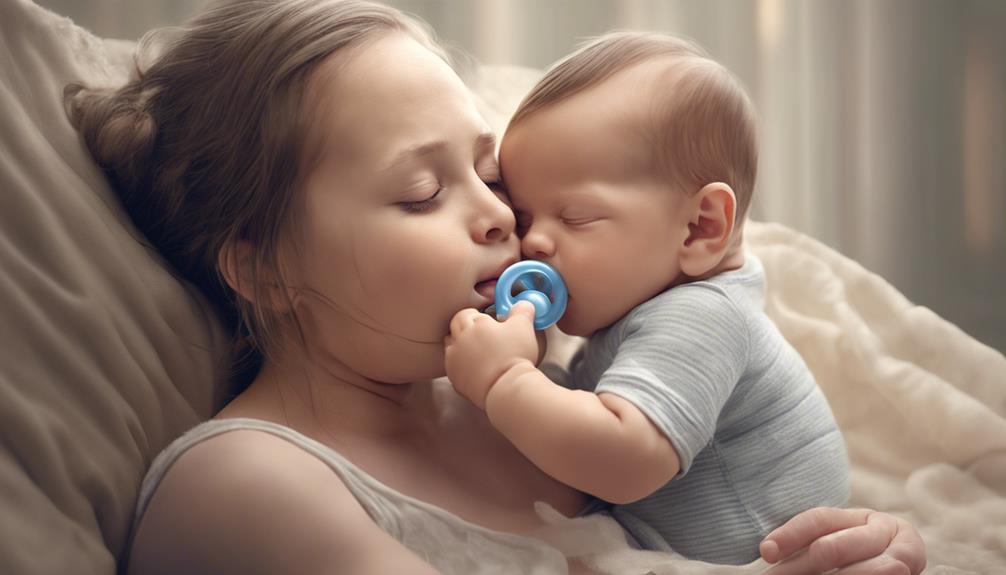
To help relax your newborn's diaphragm and potentially stop hiccups, consider offering them a pacifier to suck on. Pacifiers are more than just a source of importance; they can play a vital role in soothing your little one.
By sucking on a pacifier, your baby may find relief from those pesky hiccups. The act of sucking can help distract your baby's diaphragm, possibly putting an end to the hiccup episode. Not only does the sucking reflex triggered by the pacifier provide a comforting sensation, but it may also assist in regulating your baby's breathing pattern.
This can be especially helpful after burping, as it aids in settling your newborn's tummy and easing any discomfort they may be experiencing. So, the next time your little one is battling hiccups, offer them a pacifier for a soothing and potentially hiccup-free experience.
Change Your Baby's Position

To help alleviate your baby's hiccups, try changing their position. Holding your baby upright against your chest or placing them in a slightly inclined position can aid in digestion and reduce hiccups.
Remember to keep your baby comfortable and avoid putting pressure on their tummy while trying these positioning techniques.
Positioning Techniques
Looking to ease your newborn's hiccups? Changing your baby's position after burping can help alleviate those pesky hiccups.
Here are some positioning techniques to try:
- Hold your baby upright to shift trapped air bubbles.
- Place your baby on their tummy to aid in stopping hiccups.
- Experiment with different positions to find what works best for soothing your baby's diaphragm spasms.
Gentle Patting Method
Wondering how to effectively use the gentle patting method to change your baby's position and alleviate hiccups?
After burping your newborn, gently pat or rub their back in a soothing and rhythmic manner. This gentle approach helps release any trapped air bubbles that might be causing hiccups.
Consider altering your baby's position by holding them upright against your shoulder or laying them on their tummy to aid in resolving hiccups.
Remember, avoiding vigorous movements is key; opt for gentle patting to stimulate the diaphragm and provide comfort to your little one.
Consistent and calming back patting can assist in stopping hiccups, making the experience more soothing for both you and your newborn.
Try a Little Bit of Sugar Water
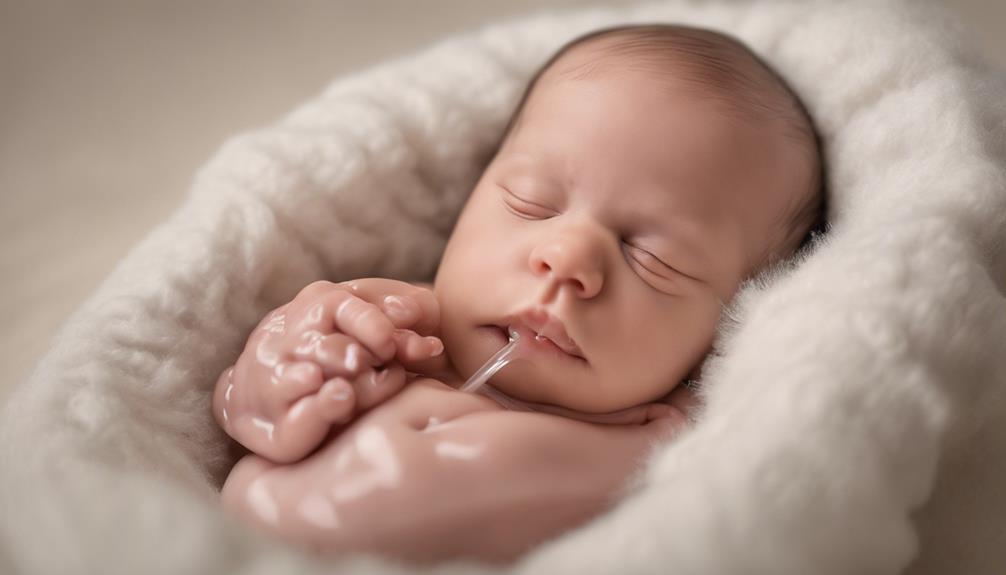
Consider trying a small amount of sugar water to help soothe your newborn's hiccups. Sugar water has been a traditional remedy believed to stimulate the vagus nerve, potentially interrupting hiccups. Here are some key points to keep in mind:
- The sweet taste of sugar water may distract your baby and stop the hiccups.
- A small dose of sugar water could trigger a swallowing reflex, which might help alleviate the hiccups.
- Remember, it's important to consult your healthcare provider before giving sugar water to your newborn to guarantee safety and determine the correct dosage.
While sugar water is a common approach to calming hiccups in newborns, its effectiveness lacks scientific evidence. Prioritize your baby's well-being by seeking professional advice before attempting this remedy.
Provide Gentle Motion or Rocking

To help alleviate your newborn's hiccups, gently rock or sway them to relax the diaphragm and provide soothing comfort. The rhythmic movement created by rocking or swaying can help regulate your baby's breathing and potentially halt the hiccups. This motion distraction can be incredibly soothing and comforting for your little one. Whether you choose to rock in a chair or gently bounce your baby in your arms, the goal is to provide a sense of security and calmness.
| Gentle Motion Benefits | How to Implement |
|---|---|
| Relaxes diaphragm | Rock in a rocking chair |
| Stops hiccups | Gently bounce in your arms |
| Soothing comfort | Combine with burping |
Combining gentle motion with other techniques like burping and offering a pacifier can create a holistic approach to calming your baby. Remember, the goal is to create a serene environment that helps your newborn feel at ease and content.
Utilize White Noise or Gentle Sounds

When soothing your newborn's hiccups, consider incorporating white noise or gentle sounds to create a calming environment that may help alleviate their discomfort. White noise, like soft music or a calming sound machine, can distract and soothe your baby, potentially stopping hiccups. Additionally, gentle sounds such as a lullaby or nature noises can create a soothing atmosphere for your little one to relax. The rhythmic nature of white noise can assist in regulating your baby's breathing and diaphragm, aiding in resolving hiccups efficiently.
- White noise can distract and soothe the baby.
- Gentle sounds like lullabies can create a soothing environment.
- The rhythmic nature of white noise helps regulate breathing and diaphragm.
Consider Feeding in an Upright Position

Feeding your newborn in an upright position can notably reduce the likelihood of hiccups after burping by utilizing gravity to aid in digestion. When you hold your baby in a vertical feeding position, you help prevent them from swallowing excess air, which in turn reduces the risk of hiccups. By keeping your little one upright during feeding, you also minimize pressure on their diaphragm, making hiccups less likely to occur post-burping. This position aids in keeping milk in their stomach, ultimately decreasing the chances of reflux and subsequent hiccups. Opting for a semi-upright feeding position can be particularly beneficial for babies prone to frequent hiccups, as it promotes smoother digestion and minimizes air intake.
| Benefits of Feeding in an Upright Position |
|---|
| Reduces hiccups risk |
| Aids digestion with gravity |
| Minimizes diaphragm pressure |
| Helps keep milk in the stomach |
| Reduces the likelihood of reflux |
Frequently Asked Questions
How Do I Stop My Baby From Hiccuping After Burping?
To stop your baby from hiccuping after burping, try keeping them upright for 10-15 minutes, patting their back gently, offering a pacifier, avoiding overfeeding, changing their position, or gentle rocking. These methods can help soothe and prevent hiccups.
Do Hiccups Mean Baby Needs to Be Burped?
Hiccups in babies don't always signal a need to burp. They can stem from various causes like diaphragm irritation. Burping is essential to release trapped air. It's still wise to burp your baby post-hiccups to aid comfort.
Is It OK to Lay Baby Down With Hiccups?
Yes, it's okay to lay your baby down with hiccups. Hiccups are common and don't harm your baby. If hiccups persist or cause distress, consult a pediatrician. Keeping baby upright after feeding can help if hiccups are due to reflux.
How Do You Calm a Baby's Hiccups?
When your baby's hiccups disrupt their peace, gently patting their back or offering a little water can work wonders. Letting the hiccups fade naturally and uplifting distractions like playing with a toy are simple yet effective solutions.
Conclusion
To wrap up, soothing your newborn's hiccups after burping can be easily achieved with gentle techniques like back rubbing, offering a pacifier, or changing their position.
Remember, 'an ounce of prevention is worth a pound of cure.' By incorporating these simple methods into your routine, you can help your little one find relief and comfort from hiccups after feeding.
Don't worry, you've got this!
With a rich background in writing and a keen interest in child development, she specializes in creating insightful, compassionate content that speaks directly to parents’ concerns and aspirations. Margaret believes in the power of shared experiences to bring comfort and confidence to parents everywhere.
Sleep Training
5 Reasons Why Newborns Grunt in Their Sleep
Discover the surprising truth behind why newborns grunt in their sleep – it's not what you think!

As fascinating as it sounds, did you know that approximately 60% of newborns exhibit grunting sounds during sleep?
Curious about why these little ones make such noises? Well, let's uncover the mystery behind 5 common reasons why newborns grunt in their sleep.
Key Takeaways
- Digestive issues like infant dyschezia and constipation can lead to newborn grunting.
- Grunting helps newborns adjust breathing patterns, indicating respiratory factors at play.
- Acid reflux and blocked nasal passages are common causes of grunting in infants.
- Gas discomfort from swallowing air during feeding can also contribute to newborn grunting.
Bowel Movements
When newborns grunt in their sleep, it can be a sign of potential challenges related to their bowel movements and stool passage. Infant dyschezia, a common occurrence as babies learn to defecate, can lead to grunting and straining. Soft, mushy stools are typical for newborns, but hard, dry stools may indicate constipation. This discomfort can cause babies to use their diaphragm muscles to push out stool, resulting in the grunting sounds we hear during sleep.
It's crucial to pay attention to your baby's bowel movements to ensure they're passing stool comfortably. Factors like irregular breathing, chest congestion, and illnesses can also contribute to newborn grunting in sleep. If you notice your baby having difficulty passing stool or if their stool consistency changes notably, it's advisable to consult with a healthcare provider for guidance on how to alleviate any potential issues related to bowel movements. Remember, we're here to support you through these challenging moments.
Acid Reflux

How does acid reflux impact the sleep of newborns? Acid reflux in babies can disrupt their sleep patterns, leading to discomfort and grunting sounds throughout the night. Here are some key points to contemplate:
- Common Issue: Acid reflux is a common problem among infants, causing them to experience frequent spit-ups and grunting noises while sleeping.
- Consultation: If your baby is consistently showing symptoms of acid reflux such as grunting and irritability during sleep, it's advisable to seek guidance from a pediatrician.
- Management: Simple measures like keeping the baby upright after feeding and using specialized formulas can often help alleviate mild cases of acid reflux in babies.
- Severe Cases: In more severe instances where acid reflux significantly disturbs the baby's sleep or leads to complications, medical attention may be necessary to manage the condition effectively.
Understanding how acid reflux impacts your baby's sleep is vital in providing the necessary support and care to make sure they rest comfortably.
Blocked Nasal Passages
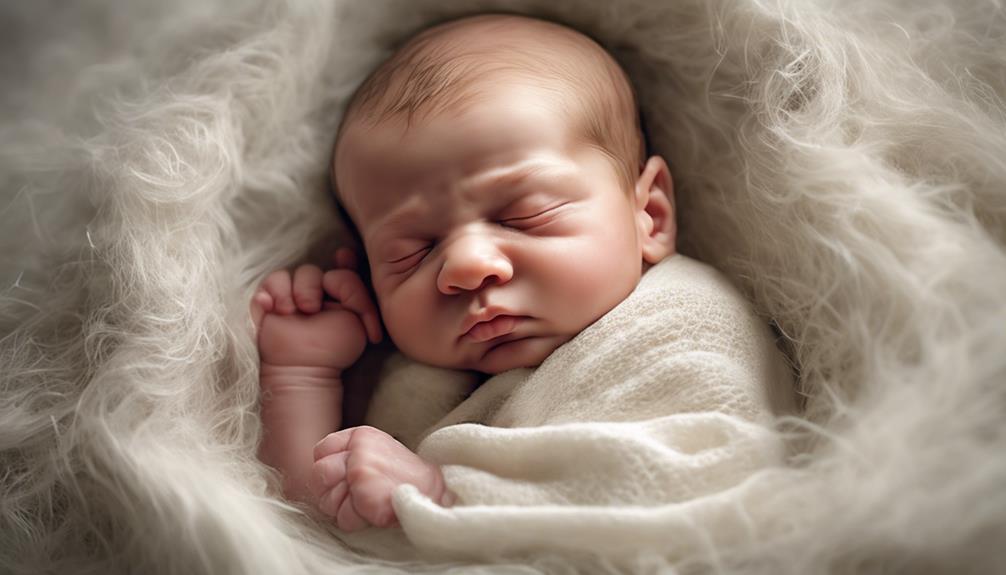
Blocked nasal passages in newborns can often result in grunting sounds during their sleep. Newborns have tiny nasal passages that can easily become blocked due to mucus or congestion, making it challenging for them to breathe comfortably. This congestion can lead to grunting noises as the baby struggles to breathe through the narrow passages. Clearing a baby's nasal passages gently can help alleviate the blockage and reduce the grunting during sleep. It is important to handle this issue delicately to guarantee the baby's breathing is not further compromised. Blocked nasal passages can also cause snoring sounds in newborns, indicating that they are having difficulty breathing properly. By keeping the baby's nasal passages clear, parents can help improve their little one's breathing and reduce the occurrence of grunting and snoring sounds during sleep.
| Blocked Nasal Passages in Newborns | Effects |
|---|---|
| Small airways and mucus | Grunting sounds during sleep |
| Congestion | Breathing difficulties |
| Narrow nasal passages | Snoring noises |
| Clearing nasal passages | Enhanced breathing |
Oxygen Intake

Shifting between sleep stages, newborns may experience changes in oxygen intake, which can lead to grunting sounds as they regulate their breathing to improve oxygen levels. Understanding why newborns grunt in their sleep due to oxygen intake can offer valuable insights into their well-being.
- Regulating Breathing: Grunting helps newborns adjust their breathing patterns to enhance oxygen intake, essential for their growing bodies.
- Respiratory Rate Variability: Factors like respiratory rate can affect how newborns grunt during sleep, indicating their effort to optimize oxygen flow.
- Oxygen Saturation Levels: Monitoring oxygen saturation levels can reveal if grunting is linked to low oxygen levels, prompting timely interventions.
- Health Implications: Proper oxygen intake is essential for newborns' health and development, underscoring the importance of observing their breathing patterns during sleep.
Gas Passing
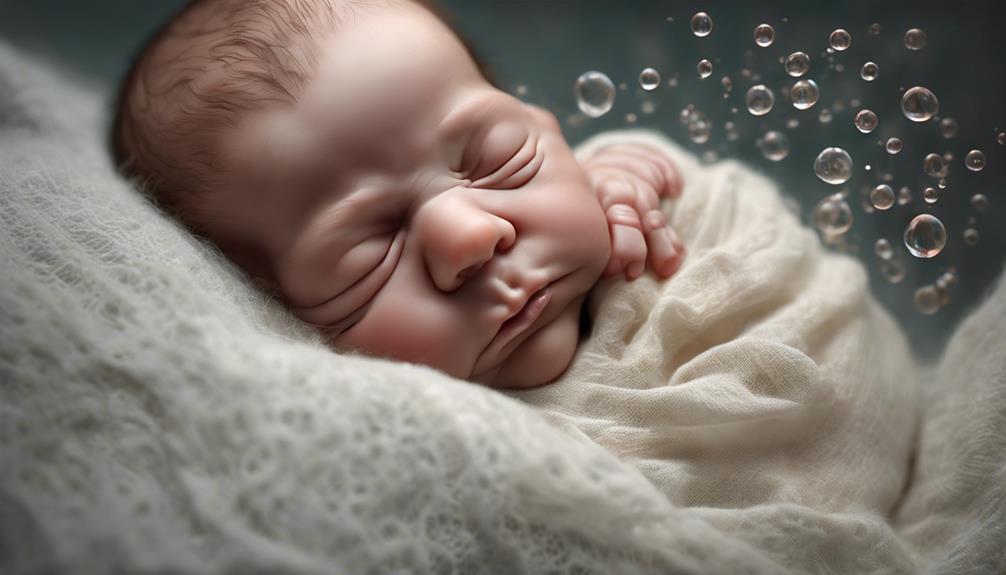
Newborns may also grunt in their sleep due to discomfort caused by gas passing. When babies swallow air during feeding, it can lead to gas buildup in their tiny tummies, causing gassiness and resulting in grunting sounds during sleep. Their immature digestive systems can struggle to process this gas efficiently, leading to further discomfort. This discomfort manifests as grunting while the baby tries to pass the gas.
To help alleviate this issue, gentle tummy massages can be beneficial in relieving gas and reducing the frequency of grunting episodes. These massages can aid in moving the trapped gas along the digestive tract, providing relief to the baby. Additionally, ensuring proper burping techniques after feeding can help minimize the amount of swallowed air, ultimately reducing gas buildup and potential grunting during sleep.
Understanding the connection between gas passing discomfort and newborn grunting can assist caregivers in comforting and aiding their little ones for a more peaceful sleep.
Frequently Asked Questions
Why Does My Baby Grunt so Much While Sleeping?
We acknowledge the concern when babies grunt in their sleep. It's typical as they learn muscle control. If your baby seems uncomfortable or there are other symptoms, consulting a healthcare provider is essential for peace of mind.
Why Does My Newborn Make Strange Noises While Sleeping?
We all wonder why our newborns make strange noises during sleep. It's often due to their developing systems. Grunting helps regulate breathing and digestion. Most sounds are normal, but understanding these behaviors is key to easing parental concerns.
Why Is My Baby Grunting While Breathing?
I comprehend how concerning it is to hear your baby grunt while breathing. Grunting in newborns is often due to their developing respiratory system and airway size. It helps regulate breathing, especially during deep sleep.
Why Does My Newborn Make a Choking Sound While Sleeping?
It is understood that newborns might make choking sounds while sleeping due to their developing airways and mucus. It's natural for them to adjust breathing patterns. Recognizing these behaviors can reassure parents and differentiate normal noises from distress signals.
Conclusion
To sum up, it's common for newborns to grunt in their sleep due to various reasons such as bowel movements, acid reflux, blocked nasal passages, oxygen intake, and gas passing. Understanding these factors can help ease parental concerns and navigate through these sounds with confidence.
Did you know that up to 70% of newborns experience some form of acid reflux in their first few months of life? It's important to be aware of these common issues to provide the best care for your little one.
Pamela is the voice behind our vibrant community, fostering connections and conversations among parents. Her expertise in community engagement and personal experiences as a parent fuel her passion for creating a supportive space for all. Pamela believes that community is crucial for navigating the complexities of parenting, offering a place for sharing, learning, and growing together.
Sleep Training
How My Newborn Won't Sleep in Bassinet: A Guide to Help
Lullabies and soothing techniques could be the key to finally getting your newborn to sleep in their bassinet – find out how!

As parents, we empathize with the frustration that comes with a newborn who just won't settle in their bassinet. The constant waking, the endless rocking – it can feel like an endless cycle.
But what if we told you there might be a simple solution to help your little one drift off peacefully? Stay tuned to uncover practical tips and strategies that could make a world of difference in your baby's sleep routine.
Key Takeaways
- Address discomfort and habits gently to ease bassinet sleep resistance.
- Importance of bassinet sleep for newborns: safety, bonding, and healthy habits.
- Tips: swaddle, safe environment, routine, and pacifiers for newborn sleep.
- Cozy sleep environment: soft bedding, ideal temperature, safety guidelines, and simplicity.
Common Reasons for Bassinet Sleep Resistance
If your newborn is resisting sleep in the bassinet, it's common for parents to feel overwhelmed by the situation. Sleep resistance can stem from various factors like discomfort, gas, reflux, or overtiredness. Sometimes, babies develop learned habits of being held, making them prefer sleeping in your arms rather than the bassinet. Moving to the bassinet requires patience and consistency to break these existing habits gently.
Associations play a significant role in your baby's preference for sleep environments. They may resist the bassinet because it doesn't align with their familiar sleep associations. Understanding the root causes behind this resistance, such as addressing any discomfort or breaking learned habits, can help your baby adapt to sleeping in the bassinet more easily.
Importance of Bassinet Sleep for Newborns
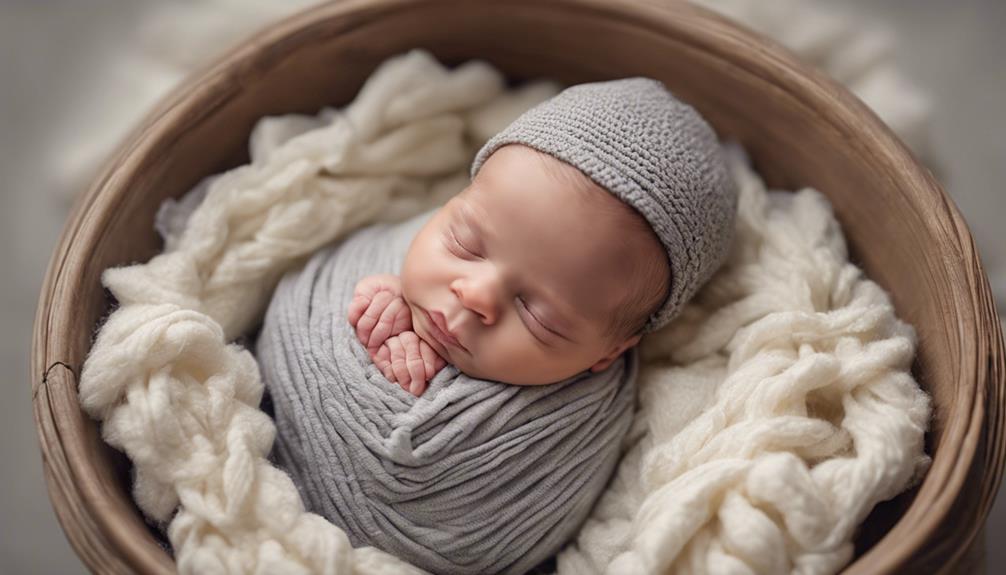
When newborns sleep in a bassinet, they benefit from a safe and nurturing environment that promotes healthy sleep practices recommended by the AAP. The American Academy of Pediatrics (AAP) suggests bassinet sleep as a way to reduce the risk of SIDS (Sudden Infant Death Syndrome) in newborns. Room-sharing with a baby in a bassinet not only fosters a strong bond but also enables easy monitoring during sleep, giving parents peace of mind. By having newborns sleep on a flat surface in a bassinet without additional items, the chances of suffocation and overheating are minimized. Establishing a routine of bassinet sleep early on can help instill healthy sleep habits that will benefit the baby in the long run. Bassinets provide a secure and snug space for newborns to rest comfortably, ensuring they have a peaceful sleep environment conducive to their growth and development.
| Benefits of Bassinet Sleep for Newborns | |
|---|---|
| Reduces risk of SIDS | |
| Promotes bonding with parents | |
| Prevents suffocation and overheating | |
| Establishes healthy sleep habits | |
| Provides a cozy and secure sleep space |
Tips for Getting Newborns to Sleep

Introducing the bassinet consistently for naps and bedtime can help create a familiar and comforting sleep environment for your newborn. When it comes to getting your newborn to sleep, here are some tips to guide you:
- Swaddle: Wrapping your baby snugly in a swaddle can provide a sense of security and mimic the coziness of the womb.
- Crib: Make sure the crib or bassinet is free of loose bedding or toys to maintain a safe sleep space for your baby.
- White Noise Machine: Using a white noise machine can help drown out other sounds and create a soothing environment for your little one.
- Bedtime Routine: Establishing a consistent bedtime routine can signal to your newborn that it's time to sleep, making the change to the bassinet smoother.
- Pacifiers: Offering a pacifier can help comfort your baby and satisfy their need to suck, promoting relaxation and sleep.
Creating a Cozy Sleep Environment

To guarantee your newborn feels cozy and secure in the bassinet, focus on creating a sleep environment that promotes comfort and safety.
Use soft, breathable bedding in the bassinet to provide a gentle surface for your baby to rest on. Make sure the bassinet is positioned away from drafts and direct sunlight to maintain an ideal sleeping environment. Keep the room temperature between 68-72 degrees Fahrenheit to help your little one sleep better.
Consider using a fitted sheet and a sleep sack to keep your baby snug and secure during the night. Remember to follow safe sleep guidelines and avoid overcrowding the bassinet with toys or extra bedding to prevent suffocation risks.
Addressing Newborn Sleep Challenges

Browsing through newborn sleep challenges requires comprehension and patience to help your little one adjust to the comfort of sleeping in a bassinet. When your newborn won't sleep in a bassinet, it can be frustrating, but with persistence and understanding, you can overcome these hurdles.
Here are some practical tips to address newborn sleep challenges:
- Identify Discomfort: Check for reflux, gas, or other discomforts that may be causing your baby to resist the bassinet.
- Combat Overtiredness: Make sure your baby isn't too tired when trying to put them down in the bassinet.
- Break Sleep Habits: Help your baby shift by gently breaking habits of only sleeping in your arms.
- Consistency is Key: Establish a consistent bedtime routine to signal to your baby that it's time to sleep in the bassinet.
- Be Patient: Remember, habits take time to change, so be patient and consistent in your efforts.
Conclusion
To sum up, establishing healthy sleep habits for newborns can be challenging, but with patience and persistence, it's possible to get them to sleep in a bassinet. Remember, 80% of infants who sleep in a safe sleep environment are less likely to experience sleep-related incidents.
By creating a cozy sleep environment, addressing newborn sleep challenges, and following safe sleep practices, parents can help their little ones develop independent sleep habits for a better night's rest.
Nancy combines her love for writing with a deep understanding of the diverse dynamics of family life. As a parent, she brings personal experience and empathy to her work, covering topics from early childhood to the teenage years. Nancy’s work is driven by the belief that every family’s story is unique, and sharing these stories can inspire and support others on their parenting journey.
-

 Newborn Care3 months ago
Newborn Care3 months agoBest Position to Help Newborn Poop: A Step-by-Step Guide
-

 Breastfeeding/Formula Feeding3 months ago
Breastfeeding/Formula Feeding3 months agoWeight Loss Diet While Breastfeeding: Top Tips for Success
-

 Breastfeeding/Formula Feeding3 months ago
Breastfeeding/Formula Feeding3 months agoBalanced Diet While Breastfeeding: A How-To Guide
-

 Breastfeeding/Formula Feeding3 months ago
Breastfeeding/Formula Feeding3 months ago10 Keto Diet Tips While Breastfeeding
-

 Newborn Care3 months ago
Newborn Care3 months agoWhy Does My Newborn Keep Getting Hiccups: A Parent's Guide
-

 Sleep Training2 months ago
Sleep Training2 months agoEnsuring Your Newborn Sleeps Safely With Head to Side
-

 Newborn Care3 months ago
Newborn Care3 months agoHow to Get Your Newborn to Poop: A Step-by-Step Guide
-

 Newborn Care2 months ago
Newborn Care2 months agoUnderstanding Newborn Dark Green Poop: A Comprehensive Guide












